History of Paris Saint-Germain F.C.
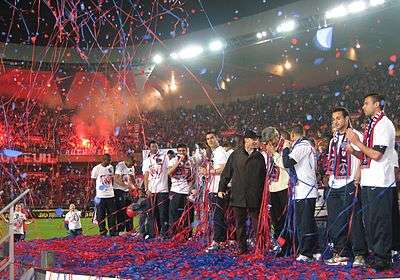
Paris Saint-Germain Football Club was born on 12 August 1970 after the fusion of Paris FC – created a year earlier to fill the void of having no top-flight club in the capital – and Stade Saint-Germain, founded in 1904 in Saint-Germain-en-Laye, the birth town of Louis XIV.[1]
PSG won promotion to Ligue 1 in 1974, but did not win any silverware in the 1970s. The club went on to win its first titles during the next decade: the Coupe de France in 1982 and 1983 and the league in 1986. In the 1990s, Canal+ propelled PSG to the forefront of the European game. The club from the French capital made five European semi-finals in a row between 1993 and 1997, won a second league title in 1994 and lifted the UEFA Cup Winners' Cup in 1996.[1]
At the start of the 21st century, PSG struggled to rescale the heights. This changed in 2011 with the arrival of new owners, Oryx Qatar Sports Investments (QSi) and president Nasser Al-Khelaifi. They established an extremely ambitious project to conquer the UEFA Champions League and making the club France's biggest name.[1] PSG have already become the most successful French club in history, with 38 top-flight trophies, including 20 since the arrival of QSi.[1][2]
Early years (1970–1978)
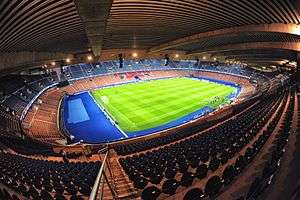
Towards the end of the 1960s, an ambitious group of businessmen decided to create a major club in the French capital. They chose to merge their virtual side, Paris FC, with Stade Saint-Germain after the team from Saint-Germain-en-Laye, 15km west of Paris, won promotion to Ligue 2.[3] After a petition was signed by 20,000 people, Paris Saint-Germain Football Club were founded on 12 August 1970. PSG are today the city's largest club by far.[4]
PSG made an immediate impact both on and off the pitch, building a substantial fanbase and winning promotion to Ligue 1 in their first season after claiming the Ligue 2 title.[3][5] Their momentum was soon checked, however, and the club split into two in 1972.[3] One branch joined CA Montreuil and continued in the first division under the name of Paris FC, while PSG assumed amateur status and had to restart in the third division. Therefore, PSG have never formally been relegated from Ligue 1.[6]
PSG really took flight in 1973, when fashion designer Daniel Hechter took over the club and designed its classic jersey. Coached by French football legend Just Fontaine, PSG returned to Ligue 1 in 1974 and slowly began attracting the first stars of the Red-and-Blues such as Mustapha Dahleb and Carlos Bianchi.[1]
The club also moved into the Parc des Princes that year after spending their formative seasons using the Stade Municipal Georges Lefèvre.[3][5] Since then, PSG have always played in Ligue 1.[6] Top-tier status was attained within four years and by the end of the 1970s, the Red-and-Blues were ready to embark upon a historic decade.[7]
First titles and Golden era (1978–1998)
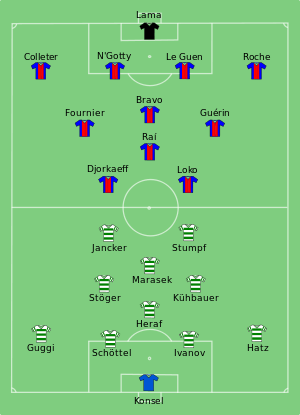
In 1978, Daniel Hechter handed control of the club to Francis Borelli, under whose guidance the Parisians won their first silverware: the Coupe de France in 1982 and 1983 and the league in 1986, during a decade marked by players such as Safet Sušić, Luis Fernández and Dominique Rocheteau.[1]
These successes in turn led to European involvement, with the club sampling top continental competition for the first time in their history. Despite no achievements during that period, the club won many fans due to their entertaining style of play and their matches against Juventus in particular live long in the memory of seasoned fans.[5] However, competition for recognition as the capital's No1 sporting entity came from Matra Racing between 1984 and 1989, and PSG went into decline.[4]
It was not until the 1990s that PSG really started to develop as a giant of French football. The club entered their 'Golden Era' following the takeover and an avalanche of trophies followed, not to mention the first wave of world-class players to grace the hallowed Parc des Princes turf thanks to the investment of their owners.[5] The takeover by broadcaster Canal+ in 1991 revitalised the club.[4] Now enjoying serious investment, the capital outfit were able to set their sights steadily higher.[7]
Two seasons later, the Parc des Princes welcomed back UEFA Cup football in what would prove to be an unforgettable campaign given the calibre of opponent: PAOK, Napoli, Anderlecht and Real Madrid all fell by the wayside before PSG once again succumbed to their bête noire, Juventus, in the last four.[7]
That defeat notwithstanding, the club were on the move and between 1993 and 1997 they contested two UEFA Cup Winners' Cup finals (in 1996 and 1997),[1] reached the UEFA Champions League semi-finals once and twice advanced to the same stage of the UEFA Cup.[7][5]
PSG's crowning glory came with triumph in the 1996 UEFA Cup Winners' Cup Final, Bruno N'Gotty hitting the only goal as Rapid Wien were defeated 1–0. A year later, the Parisians finished runners-up to Barcelona in the same competition.[3] On the domestic scene, results were just as satisfying, with PSG celebrating another Ligue 1 title, three French Cups, two French League Cups and just as many French Trophy of Champions wins.[7][5]
At the time, the players lighting up the Parc were also mainstays of their national sides. Bernard Lama, Alain Roche, Paul Le Guen, Vincent Guérin, David Ginola and Youri Djorkaeff all enjoyed stints with France, while Ricardo, Valdo, Raí and Leonardo were regulars for Brazil. But perhaps the greatest talent of all was prolific Liberian marksman George Weah, who followed in the footsteps of PSG's many fine strikers by firing 55 goals in 137 games.[7]
Decline and revival (1998–2013)
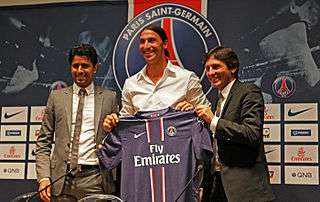
PSG then went into decline following years of mismanagement.[5] The club's form dwindled as they slipped further down the table and eventually, a split from owners Canal+ became inevitable. After years of underachievement, Canal+ sold the club to Colony Capital, Butler Capital Partners and Morgan Stanley in 2006. Colony Capital eventually bought out Morgan Stanley's shares in the club to become 95% owners.[5]
Five more trophies arrived (three French Cups, one League Cup and one UEFA Intertoto Cup) and the Parc des Princes faithful also got to marvel at the likes of Marco Simone, Jay-Jay Okocha, Nicolas Anelka, Ronaldinho, Gabriel Heinze, Juan Pablo Sorín, Mario Yepes and Pauleta.[2][7] However, the club became better known for lurching from one high-profile crisis to another.[5] Indeed, PSG even spent two seasons staving off relegations that were only very narrowly avoided.[7]
PSG finally restored a sense of balance in 2011, when the club was purchased by Oryx Qatar Sports Investments (QSi) after two years of solid progress and stability under the stewardship of manager Antoine Kombouaré and president Robin Leproux.[4][5] The takeover made Paris Saint-Germain not only the richest club in France but one of the wealthiest in the world.[8]
QSi pledged to form a team capable of winning the UEFA Champions League and making the club France's biggest name. Club legend Leonardo was brought back in a sporting director capacity and oversaw a spending spree that has so far been unprecedented in Ligue 1 history. Despite finishing behind Montpellier in the 2011–12 season, PSG set a league record of 79 points for a second-placed team.[5]
Led by star player Zlatan Ibrahimović, team captain Thiago Silva and famous manager Carlo Ancelotti, the elusive league crown was finally brought back to Paris in the 2012–13 season. Zlatan's 30-goal haul almost single-handedly led the capital side to its first Ligue 1 title in 19 years, and third overall. However, PSG were unlucky to be eliminated from the Champions League on away goals Barcelona in the quarter-finals after drawing both games.[9]
Domestic hegemony (2013–)
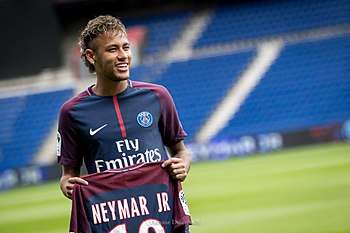
Big money signings continued with the arrival of Edinson Cavani in 2013 and David Luiz in 2014 to the club.[4] Despite the departure of Carlo Ancelotti, PSG kept its winning ways under Laurent Blanc. The club secured a maiden domestic treble (Ligue 1, French League Cup and French Super Cup) in the 2013–14 season,[10] before claiming an unprecedented national quadruple (Ligue 1, French Cup, League Cup and Super Cup) twice in a row in 2015 and 2016.[11] However, Blanc's teams were never able to advance past the quarterfinals of the Champions League, a goal that president Nasser Al-Khelaifi and ownership group Qatar Sports Investments made clear was the ultimate benchmark for the club's success.[12]
Fresh from three consecutive UEFA Europa League titles with Sevilla, Unai Emery was hired by PSG for his European pedigree.[12] But with star player Zlatan Ibrahimović also gone,[13] the club endured a disappointing 2016–17 season.[14] Paris SG were pipped to the Ligue 1 title by Monaco, missing out on top spot for the first time in five years. Additionally, PSG also surrendered a 4–0 first-leg lead over Barcelona with a 6–1 thrashing at Camp Nou in the last-16 of the Champions League.[14] Nevertheless, they secured the Super Cup,[13] the League Cup,[14] and a record 11th French Cup.[15]
PSG further built upon this success by forming a fearsome attacking trio in 2017.[16] It consisted of Edinson Cavani (already at the club), world-record transfer Neymar (€222m),[17] and 18-year-old French prodigy, as well as the second-most expensive player in the world, Kylian Mbappé (€180m).[18] In 2017–18, the club claimed a domestic quadruple for the third time in four seasons.[19] With PSG fans promised European glory in light of their massive expenditure, the club's French quadruple was not enough after its Champions League exit at the hands of Real Madrid in the last-16.[20] Unai Emery left PSG at the end of the season after failing to deliver European glory.[21]
References
- 1 2 3 4 5 6 7 "Histoire". PSG.fr. Archived from the original on 19 August 2017. Retrieved 17 July 2017.
- 1 2 "Paris S-G: Histoire du club dans chaque compétition". Footballdatabase.eu. Retrieved 2 March 2017.
- 1 2 3 4 5 "Paris Saint-Germain FC". UEFA.com. 19 June 2013. Archived from the original on 3 September 2014. Retrieved 18 June 2014.
- 1 2 3 4 5 "Paris city guide". UEFA.com. Archived from the original on 9 July 2016. Retrieved 4 July 2016.
- 1 2 3 4 5 6 7 8 9 10 11 "A brief history of PSG". ESPN FC. 17 August 2012. Archived from the original on 12 November 2015. Retrieved 18 June 2014.
- 1 2 "Which European football clubs have never been relegated?". The Guardian. 2 June 2015. Archived from the original on 2 February 2017. Retrieved 24 January 2017.
- 1 2 3 4 5 6 7 8 "PSG firmly in the pantheon". FIFA.com. 17 October 2008. Archived from the original on 5 October 2015. Retrieved 18 June 2014.
- ↑ "Paris Saint-Germain, having conquered France, are still working on Qatar". The National. 30 December 2015. Archived from the original on 18 April 2017. Retrieved 17 April 2017.
- ↑ "Paris Saint-Germain – 2012/13 Season Review". French Football Weekly. 12 June 2013. Retrieved 22 September 2017.
- ↑ "Paris Saint-Germain: 2013/14 Season Review". French Football Weekly. 27 May 2014. Retrieved 22 September 2017.
- ↑ "Identité". PSG.fr. Retrieved 22 September 2017.
- 1 2 "Paris Saint-Germain hire Unai Emery as manager to replace Laurent Blanc". ESPN FC. 28 June 2016. Retrieved 8 August 2017.
- 1 2 "PSG and Unai Emery impress in Trophee des Champions win vs. Lyon". ESPN FC. 6 August 2016. Retrieved 8 August 2017.
- 1 2 3 "PSG 2016-17 season review: Results, roster changes, and 2017 summer transfer targets". SBNation.com. 22 May 2017. Retrieved 8 August 2017.
- ↑ "PSG summer briefing: International Champions Cup, Trophee des Champions, transfers". ESPN FC. 12 June 2017. Retrieved 8 August 2017.
- ↑ "Neymar-Mbappe-Cavani send out a Champions League message". Goal.com. 12 September 2017. Retrieved 1 October 2017.
- ↑ "Neymar: Paris St-Germain sign Barcelona forward for world record 222m euros". BBC Sport. 3 August 2017. Retrieved 8 August 2017.
- ↑ "Paris Saint-Germain sign 'great talent' Kylian Mbappé on initial loan". The Guardian. 31 August 2017. Retrieved 8 September 2017.
- ↑ "PSG clinch quadruple with Coupe de France win". Ligue1.com. 8 May 2018. Retrieved 12 May 2018.
- ↑ "P.S.G. Tumbles Out of Champions League, Left Again to Face the Bill Without the Prize". The New York Times. 6 March 2018. Retrieved 13 May 2018.
- ↑ "Billions spent, a treble won – but all that's left is a sense of hollowness for PSG". iNews. 9 May 2018. Retrieved 12 May 2018.
External links
| Wikimedia Commons has media related to Paris Saint-Germain Football Club. |
- Official websites